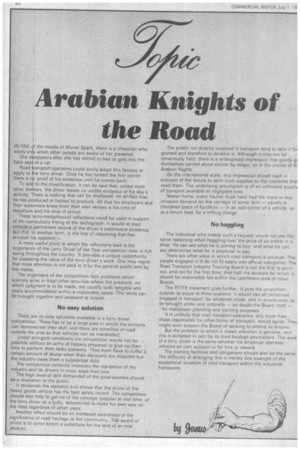Arabian Knights of the Road
Page 82

If you've noticed an error in this article please click here to report it so we can fix it.
IN ONE of the novels of Muriel Spark, there is a character who exists only when other people are aware of her presence She disappears after she has retired to bed or gets into the back seat of a car, Road transport operators could easily adapt this fantasy to apply to the lorry driver. Once he has turned the first corner, there is no proof of his existence until he comes back.
To add to the mystification, it can be said that. unlike most other workers, the driver leaves no visible evidence of his day's activity. There is nothing that can be displayed. no artifact that he has produced or helped to produce. All that his employers and their customers know from their own senses is his time of departure and his time of arrival These semi-metaphysical reflections could be used in support of the compulsory fitting of the tachograph. It would at least provide a permanent record of the driver's continuous existence. But this. in another form, is the line of reasoning that has aroused his opposrtie A more useful point to which the reflections lead is the importance of the Lorry Driver of the Year competition now in full swing throughout the country. It provides a unique opportunity for assessing the value of the lorry driver's work One may regret that more attention is not paid to it.by the general public and by the media.
The organisers of the competition face problems which scarcely arise in most other activities where the products, on which judgment is to be made, are usually both tangible and easily accommodated within a reasonable space. The items can he brought together and assessed at leisure
No easy solution
There are no easy solutions available in a lorry driver competition. There has to be a large area in which the entrants can demonstrate their skill, and there are stretches of road outside the area so that vehicles can be marshalled.
Under stringent conditions the competition would not be poSsible without an army of helpers prepared to give up their time to perform their tasks patiently. They even have to suffer a certain amount of abuse when their decisions are disputed but the industry owes them a substantial debt.
The competition certainlY improves the reputation of the industry and its drivers in more ways than one The high level of skill demanded of the prize-winners should be a revelation to the public.
It reinforces the statistics and shows that the driver of the heavy goods vehicle has the best safety record. The competition should also help to get rid of the concept. popular at one time, of the lorry driver as a bully, determined to make his own way on the road regardless of other users.
Another effect should be an increased awareness of the significance of road haulage to the community. The award of prizes is to some extent a substitute for the tack of an end product. The public not directly involved in transport tend to take it for granted and therefore to devalue it. Altnough it may not be consciously held, there is a widespread impression that goods gt themselves carried about almost by magic, as in the stories of th Arabian Nights, On the international scale, this impression shows itself in criticism of the failure to send food supplies to the countries that need them. The underlying assumption is of an unlimited supply of transport available at negligible cost Nearer home, every haulier must have had the more or less innocent demand for the carriage of some item — usually a cherished piece of furniture — in an odd corner of a vehicle, or as a return load, for a trifling charge
No haggling
The individual who makes such a request would not use the same reasoning when haggling over the price of an article in a shop He can see what he is aiming to buy. and what he can see determines what he is prepared to pay.
There are other ways in which road transport is unusual. The people engaged in it do not fit easily into official categories. The Road Transport Industry Training Board is not the first to point out, and not for the first time that half the workers for which it should be responsible fall within the catchment area of other Boards
The RTITB statement goes further. It puts the proportion outside its scope at three quartcirs. It would like all personnel engaged in transport, by whatever mode, and in distribution, to be-brought under one umbrella — no doubt the Board itself
for manpower planning and training purposes It is unlikely that road transport operators, any more than those responsible for other forms of transport, would agree They might even suspect the Board of seeking to extend its empire But the problem to which it draws attention is genuine, and this is accepted in part by its road haulage paymasters. The work of a lorry driver is the same whether his employer operates vehicles on own account or for hire or reward The training facilities and obligations should also be the same. The difficulty of arranging this is merely one example of the exceptional situation of road transport within the industrial framework.








































































































































